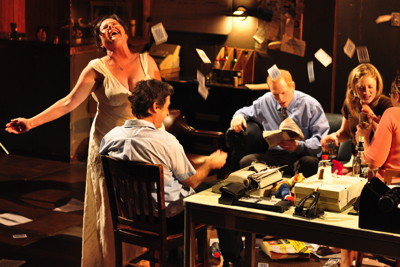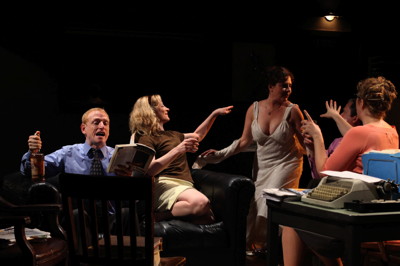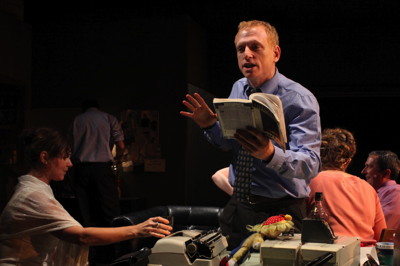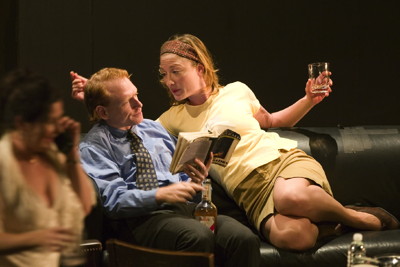
Hello readers!
A theatrical event is coming to Los Angeles that is a *must see*.
The New York-based experimental theater company, Elevator Repair Service (ERS), will be presenting their highly successful production Gatz at REDCAT late November and early December.
The acclaimed and unusual production, which has played all over Europe and various US cities since 2005, is finally coming to Los Angeles for a limited engagement, Wednesday, November 28, 2012 to Sunday, December 9, 2012. (No performances on Thursdays or Mondays.)
All shows commence at 2:00pm (excepting Sundays, 1:00pm) and continue, with two intermissions and a dinner break, until 10:00pm.
This epic marathon of theater meets literature is rapidly selling out, so book your seats soon! Info at the bottom.
READ ALL ABOUT IT!
Here follows an interview I recently conducted with the director of ERS, John Collins, and one of the company’s original members, Scott Shepherd, who plays ‘The Narrator’ Nick.
READ my interview on the LA STAGE TIMES site.
~ OR ~
You can just read it here!
Happy reading!
Long Day’s Journey Into Gatz
If you heard of a theatrical project that consisted of the reading and acting out of an entire novel over the course of a single day, which book might you consider sitting through? Several times since 2005, the New York–based experimental theater company Elevator Repair Service has staged a performance of F. Scott Fitzgerald’s classic The Great Gatsby as a marathon event. Every line of the novel is read and performed in a six-and-a-half-hour performance, broken up by two intermissions and a dinner break, between 2pm and 10pm. It’s a lot to demand from audiences and the acting company. Yet Gatz is the company’s most successful production in its 21-year history.
Elevator Repair Service, a theater ensemble, was founded in New York City by artistic director John Collins and a group of actors in 1991. Collins also directs Gatz, which stars Scott Shepherd as The Narrator, Nick.
Interviewed individually by phone, Shepherd and Collins were dealing with the immediate aftermath of “superstorm” Sandy.
Marvels Shepherd, “It’s been a bit crazy. I live in the zone where the power is out, so I’m staying at a friend’s place in Brooklyn and it’s crazy down there. It’s like Mad Max or something — a real ghost town. No stores are open, except every once in a while there’s a restaurant or a bar that’s somehow managing to serve some things. It’s been interesting.”
Collins says he was not prepared for the flooding caused by the high tide. “The river overflowed, and all of lower Manhattan, where I live, is without power right now. No electricity, no cell phone, no internet access….” Collins says he walked across the Manhattan Bridge to his office in Brooklyn to conduct this telephone interview.
Company Origins
Collins says the company name is an old joke that stuck: “It comes from when I was 11 years old. I took a career aptitude survey, something that was designed for unemployed adults to help them decide what sort of jobs to apply for, what they’d be best suited for.” He says it was on a very primitive computer, which asked a lot of simple questions, such as what kind of work you enjoyed doing, do you like working with your hands, with other people, do you enjoy technology, and so on. “It spat out some good career options at the end, and I think I got a couple. The one that I remember was ‘Elevator Repairman’ as a good career choice. So we had this running joke when we first got to New York and started ERS. We have a theater company, we have to call it Elevator Repair Service just to make that come true,” he says, laughing.
“We” were the handful of people who were working with Collins when he first came to New York, including his friend James Hannaham — no longer with the company, but one of the founding members. Recalls Collins, “I started the company in 1991 with a few friends who I had gone to school with, and a few others who I had just met working on another production together in New York.” At college, Collins had begun to create shows in the vein of The Wooster Group, also NYC-based. Collins describes Wooster as “a company that is a long-term permanent ensemble that makes original work, over long periods of time. That was my role model.”
While Collins allows that his aesthetic is different from that of Wooster Group founder Elizabeth LeCompte, he insists they share values about how to make theater. “I had an idea that I wanted to make theater out of — not so much out of plays, but out of collective research and improvisation and work that an ensemble did together,” he says. “Our early shows were made with a lot of sound text and through a lot of research and dramaturgy, basically.”
Eventually, he says, they developed a body of work that was built around their interests and that process. Early productions include one developed from a screenplay treatment that Salvador Dali wrote for the Marx Brothers. Says Collins, “Even though this thing didn’t actually exist, we ended up making a show just out of all the research we did on the Marx Brothers and Dali and that suited us because we liked things that were a little bit surreal and had a sense of humor.”
Novels as Stage Shows
Collins maintains those elements have permeated their work. While the company initially seemed resolutely “anti-play,” eventually the members gravitated toward literature as their source material. That led to a trilogy of shows based on staging novels — texts that weren’t written for the stage.
ERS began to workshop Gatz in 1999 but set it aside until 2005 due to staging rights issues. Recalls Collins, “We spent a lot of time touring Europe with Gatz and going to lots of places other than New York, Los Angeles, and London until recently.” In 2010 the company finally got permission to stage Gatz in New York. A London production followed in early 2012. Says Collins, “Los Angeles is like the crowning achievement of the seven-year history of this show.”
Meanwhile, an adaptation of William Faulkner’s The Sound and the Fury followed. ERS’s trilogy of modernist literary adaptations concluded with an adaptation of Ernest Hemingway’s The Sun Also Rises, titled The Select, which received its premiere at the Edinburgh Festival in 2010. All were adapted to the stage in different ways. For The Sound and the Fury, ERS staged a single chapter. For adapting The Sun Also Rises, as with The Great Gatsby, ERS took on the whole book, but a heavily edited version.
Thus Gatz is the only ERS show that is an epic marathon. The Sound and The Fury is a two-hour show. The Select is three hours in duration, based on the name of the café in Paris, Le Café Select, where Hemingway — and the story — spent a lot of time. Jokes Collins, “The Select also seemed like a good name for something where we really were editing a lot.”

Challenges Faced
Collins recalls tackling various interesting and exciting problems that needed deciphering if the company wanted to put the novels on stage. “We didn’t want to solve it in one swoop by just rewriting the novel into a play,” he says.
“We started out with The Great Gatsby, saying we want to see how we can get this book on stage and keep it a book.” That, of course, brought up interesting obstacles such as presenting the narrator’s voice and also somehow rationalizing speaking every word of the book and still making it compelling theater. “We didn’t want it to just be a reading, either,” adds Collins.
He emphasizes that the company has no set process or method. “It begins with some decisions and challenges that we lay out for ourselves,” says Collins. “Then we find the parameters. Gatz began with just a few of us: Scott Shepherd and I and one other actor.” Shepherd, who became the narrator and lead actor of the show, met with Collins and a co-actor in an office above a theater where they were working to discuss how they were going to approach The Great Gatsby.
Collins continues, “The first thing we had to decide was why is it that we’re reading, why does this play contain the entire text of the novel?” They looked at the first few pages and realized there wasn’t any action to stage. “We decided this thing was going to need a kind of frame. We were in this little office, and I just suggested we try to use this office as a kind of sound set.”
A theme emerged through improvisation, of Shepherd being an office worker who is obsessed with The Great Gatsby. “We played around with different ways in which Scott would sit there at the computer and then pull the book out of his desk and secretly read it. That’s the thing that you have to understand about the process: it’s playful. It’s not about really sitting around and trying to come up with very deep, serious ideas. We’re just having fun.”
Through experimentation, they found the soul of the piece. Collins adds, “The Great Gatsby is such a short novel. The sensation that I got reading it was that every single word was necessary.” They discovered that the tale didn’t require tremendous theatricalization. “Just the speaking aloud of it, and creating a kind of context and a frame for that was really all it took to have a new experience of it,” says Collins.
He admits they get to have a lot of fun in the process, too: “It’s pretty silly to see this ensemble with a bunch of old typewriters and paper flying around the room and a beat-up old couch and some tables striving for all of the glamour that’s described in The Great Gatsby. But there’s a tremendous amount of sincerity, as well. I feel that where the production is most powerful, it’s also where the book is most powerful, which is in the final chapters. There’s a kind of frivolity up to that point that we match with our own frivolity — to a point.”
Audience Commitment Required
Even in non-English speaking countries, Gatz has been almost universally well-received. “It got a terrific response in the Netherlands, thought they speak pretty good English there, and a good response in Singapore as well. We had very small audiences when we brought it to Lisbon,” says Collins.
He marvel at how Gatz has transformed his company: “It has been so enormously popular that you never know how an audience in a particular place is going to respond. I do my best not to take anything for granted about it, but it’s done really well for us.”
Considering the endurance test of attending a marathon theatrical event, do they see much attrition throughout the night? “Not much,” says Collins. “It’s not the sort of thing where we start off with 400 and by the end there’s 20 diehards who are still there. No, I mean if we have an audience of 400, maybe we’ll lose 10. Actually, I have no idea.”
Adds Shepherd, “I don’t really know. I mean, some people do leave, I suppose, but generally if people stay through that first 20 minutes, they’re in for the long haul.”
As for the kind of response they are anticipating here, Collins is enthusiastic: “I’ve always had good experiences doing theater in L.A. Audiences tend to be very open-minded. We love REDCAT; it’s a great space. We’re really looking forward to it.”

The Leading Man
Shepherd, who plays the Narrator in Gatz, is currently playing Hamlet with The Wooster Group. Shepherd has been playing Hamlet almost for longer than he can remember. “I think we started that around 2005 or something like that,” he says. “I know the last time I did it in New York was 2007.” He also recently performed it in Dublin to great acclaim.
Shepherd explains the interlocking DNA of these two experimental theater groups. “The director of the Wooster Group is Elizabeth LeCompte, and she’s been working since the ’70s. There’s a whole slew of companies in New York now that could be seen as sort of coming out of the work that she’s done. John Collins worked for Liz for many years as a sound designer, so there’s definitely a spiritual and aesthetic connection there and even a very direct connection in that one director worked for the other one for years.”
Shepherd has been with ERS since 1994, which led to his first job with The Wooster Group in ’97. “They’d seen me in the Elevator Repair Service shows,” he recalls.
Both companies take an organic approach to theater, permitting the show to evolve through the process of rehearsal and exploration — the kind of energy and devotion that a lot of standard theater companies typically don’t have the time or the money to focus on.
Shepherd agrees: “Trying things out and combining things and just having the luxury of not knowing what to do or what direction to be headed — that certainly characterizes both Elevator Repair Service and the Wooster Group.”
What Shepherd found interesting about ERS, he says, was that Collins’ approach to theater stemmed from creating impossible problems for himself that he then has to solve. “It’s his modus operandi,” says Shepherd. “What became exciting to us with this Gatz thing was when we realized that the only thing we could imagine doing with The Great Gatsby was reading it from the beginning to the end. That seemed like, ‘Oh, this fits the bill of some kind of impossible challenge for us to tackle.’”
When discussing the next piece to be created after Gatz, the company hit upon the idea of a trilogy of American novels from the 1920s. Shepherd recalls, “John would always say, ‘What would we never do? For people who have seen our shows, what would they never expect us to do next?’ Somebody made the wisecrack, ‘Oh, well, the one thing we would never do is the exact same thing we just did,’ and out of that was born the idea of doing another novel. So that’s how we wound up doing The Sound of Fury and later the Hemingway.”
An Actor’s Challenge
The Great Gatsby is quite a beautiful and special novel. Shepherd generously confirms that Fitzgerald’s language is the star of the show. “There are a lot of good novels that don’t have this quality, whereas every sentence here is like candy, like little jewels of sentences, it’s just amazing,” he says. “This makes it a good choice for reading out loud that way, and the language and energy creates sustained exuberance.”
As for any performance challenges he faces, Shepherd seems to play them down. “Well, I don’t know,” he says. “I guess the challenge is not to put too much on it. The way that we set up the show is that the story is really about a guy who starts reading the book and can’t stop. Although I am playing Nick, the thing I’m really playing is the guy who is having an encounter with the book and delivering that experience or going through that experience with the audience. The central challenge for me is to come at the book again with a kind of innocence or an ability to be surprised. I have to follow a path of first-time pleasure through the book even though I’ve been through it a thousand times.”
As for the experience of performing in a marathon, Shepherd strives to encapsulate what it’s like for both performer and audience: “By the time it’s over, I feel like I’ve spent so much time with this person — meaning an imaginary person that is made up of the collective audience. It’s like I met somebody and then spent the whole day with them. I think the audience can feel that way too. That kind of time really has an effect, and it’s a different kind of time than you normally experience in theater.”
He says there’s a palpable settling-in period: “The audience are like, ‘Oh, we’re really going to sit here and listen to this guy read for eight hours,’ and that lasts for maybe 10 or 15 minutes, and then you can sort of feel when the flow of the book takes over and everybody realizes they’re going to be okay, and then it’s just an easy ride from there on out.”
Still, it’s grueling for Shepherd. “For me, of course it is exhausting, but I start with a cup of coffee when I come on. This whole thing is designed like a day at work. I literally open the door and walk into an office with a cup of coffee, and then somewhere about halfway through I have a power bar, and then we break for lunch, and then in the very last section there’s a cigarette and a scotch. I got it planned out for myself,” he says, chuckling.
He allows that the show requires extended and sustained concentration: “I often don’t realize how drained I am, because when the novel finally ends, it ends with such glory that I feel so energized when the show is over. And the audience’s reaction also gives me energy.” He says it takes another half hour before he realizes how completely spent he is.
For audiences who need to mentally prepare for a marathon, Shepherd insists, “It will be easier than you think.” Then he jokes, “You don’t have to read it, you don’t have to turn the pages. You don’t even have to find the bookmark when you want to go to the bathroom.”
Consider Gatz a luxury event. Step away from your life for a day and just surrender to a wonderful experience of a classic novel coming to life.
Gatz, Elevator Repair Service at REDCAT, 631 W. 2nd St., Downtown LA.
Opens November 28. Tues.-Sat. 2pm; Sun 1pm. Through Dec 9. Tickets: $65-$150. 213-237-2800.
About the production:
Hailed by critics around the world as a major theatrical event of historic proportions, Gatz is a bravura feat celebrated for its singular and dazzling literary alchemy. Gatz is not a retelling of The Great Gatsby, but a revelatory, seven-hour enactment of experiencing the novel, as F. Scott Fitzgerald’s American masterpiece is delivered word for word, brought to life with absolutely startling dramatic effect by a cast of thirteen.
The audacious New York theater ensemble Elevator Repair Service opens the drama in the shabby offices of a mysterious small business—where an employee finds a copy of the book on his cluttered desk and, for reasons unknown, begins reading the novel out loud. His coworkers hardly react at first, but, after a series of strange coincidences, they appear to take on the roles of The Great Gatsby’s characters.
Is the reader, “Nick”—played by The Wooster Group’s Scott Shepherd, in a superhuman turn—merely reading the novel, or he is being personally transformed by it?

REDCAT
Roy and Edna Disney/CalArts Theater
CalArts’ Downtown Center for Contemporary Arts
631 West 2nd Street,
Los Angeles, CA 90012
(In the heart of downtown Los Angeles on the northeast corner of the intersection of W. 2nd and Hope Streets. Housed in the Walt Disney Concert Hall complex, REDCAT has its own street entrance on 2nd Street.)
Dates and ticket prices:
| WED 11/28 2:00 pm |
$135 | $105* | $65* |
| FRI 11/30 2:00 pm |
$150 | $120* | $75* |
| SAT 12/1 2:00 pm |
$150 | $120* | $75* |
| SUN 12/2 1:00 pm |
$150 | $120* | $75* |
| TUES 12/4 2:00 pm |
$135 | $105* | $65* |
| WED 12/5 2:00 pm |
$135 | $105* | $65* |
| FRI 12/7 2:00 pm |
$150 | $120* | $75* |
| SAT 12/8 2:00 pm |
$150 | $120* | $75* |
| SUN 12/9 1:00 pm |
$150 | $120* | $75* |
Bookings:
Purchase tickets online or call the REDCAT box office at 213-237-2800.







[…] Go here to read my interview with John Collins and Scott Shepherd. […]